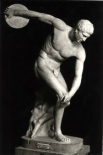
Psalm of Montreal
Samuel Butler
Stowed away in a Montreal lumber-room
The Discobolus standeth and turneth his face to the wall,
Dusty, cobweb-covered, maimed and set at naught,
Beauty crieth in an attic, and no man regardeth.
O God, O Montreal!
Whole or maimed, always and alike beautiful,
He preacheth gospel of grace to the skins of owls,
And to one who seasoneth the skins of Canadian owls!
O God, O Montreal!
When I saw him I was wroth, and I said: “O Discobolus,
Beautiful Discobolus, a prince both among gods and men,
What dost thou here, how camest thou here, Discobolus,
Preaching gospel in vain to the skins of owls?”
O God, O Montreal!
I turned to the man of skins, and said to him: “O thou man of skins,
Wherefore hast thou done this, to shame the beauty of the Discobolus?”
But the Lord had hardened the heart of the man of skins,
And he answered: “My brother-in-law is haberdasher to Mr. Spurgeon.”
O God, O Montreal!
“The Discobolus is put here because he is vulgar,
He hath neither vest nor pants with which to cover his limbs;
I, sir, am a person of most respectable connections,
My brother-in-law is haberdasher to Mr. Spurgeon.”
O God, O Montreal!
Then I said: “O brother-in-law to Mr. Spurgeon’s haberdasher,
Who seasonest also the skins of Canadian owls,
Thou callest trousers ‘pants,’ whereas I call them ‘trousers,’
Therefore thou art in hell-fire, and may the Lord pity thee!”
O God, O Montreal!
“Preferest thou the gospel of Montreal to the gospel of Hellas,
Gospel of thy connection with Mr. Spurgeon’s haberdasher to the gospel of the Discobolus?”
Yet none the less blasphemed he beauty, saying: “The Discobolus hath no gospel,
But my brother-in-law is haberdasher to Mr. Spurgeon.”
O God, O Montreal!
What a clever Aesthetic Movement blast at philistinism, and peppered with delightful absurdities. I guess I’ll really have to read some Butler, I thought – Erewhon, at least.
I should have left it at that, but I wondered who Mr. Spurgeon was. A Canadian VIP, the Governor of Quebec, perhaps?
Turning to Google, I found out too much. Butler’s poem became a bit less absurd, a bit more pointed. It turns out that, instead of being a general send-up of provincial attitudes, it is a satire targeting Charles Spurgeon, who was the Billy Graham of London in mid 19th century. Spurgeon preached about 3,600 sermons and published almost all of them. His audiences, in huge halls, sometimes numbered 10,000 people. (At one of those meetings, someone yelled “Fire!” Two people died in the ensuing stampede.)
The style of Butler’s poem is a parody of the style of Spurgeon’s sermons.
Having descended this far into the mundane, thus irrevocably tarnishing with particularity what seemed at first to be a great burst of the poetic imagination, I went even further and did a Google search for “Samuel Butler” and “Charles Spurgeon.” That turned up an article in a 1984 Montreal Gazette which told the tale.
Butler, in Montreal on business in 1875, wandered into a workroom at the Museum of Natural History. There he found an elderly Cornishman, Samuel W. Passmore, the official Taxidermist to the Montreal Natural History Society, busy at work stuffing an owl. (The owl, incidentally, is the museum’s symbol.) Butler also saw, tucked away in a corner, plaster casts of several well-known sculptures of ancient Greece. Considering that this was Victorian Montreal, Butler was hardly surprised to see these masterpieces of nakedness hidden where they would not embarrass the general public, nevertheless, he disingenuously inquired of Passmore, “I see you have some antiques here, why don’t you put them out where people can see them?”
Passmore pointed out that the statues were vulgar. For example, that Discobulus had no pants.
Passmore’s brother was a partner in the London printing firm which had the contract to publish all of Charles Spurgeon’s books, and Passmore wanted everyone to know about this great connection of his. It was, of course, much more important than being Spurgeon’s haberdasher. Spurgeon’s books of sermons and other inspirational works were then, and remain today, best-sellers of Christian inspiration. The Spurgeon contract would have made Passmore’s brother a pretty consequential man in London of that time.
Applying poetic license, Butler made the brother who was a publisher into a brother-in-law who was a haberdasher. A brilliant move, not only because it turned Passmore, “the man of skins,” into a comical bumpkin rather than a slightly pathetic name-dropper, but because the number of syllables in “brother-in-law” and “haberdasher” accentuate the fatuousness of Passmore’s glorying in his link with Spurgeon.
Has learning all this information, thanks to the magic of Google, enriched my experience of this poem? No, unfortunately. The poem, discovered serendipitously and first read in innocent wonder, seemed almost magical in its combination of elements. For example, why make it a psalm? The inspiration of genius, I assumed. Now I know better. It was a dig at Spurgeon.
Without Google, of course, I might well have come across all this information eventually, but in the meantime I would have had a few months, a few years, a few decades, perhaps, of enjoying the poem as a tabula rasa.
“Tabula rasa” refers to the subject of the previous sentence, not the object. And isn’t it preferable, when it comes to aesthetic experience, to be a tabula rasa, at least at first? to take in a poem or a painting or a piece of music without knowing anything about its back story, just experiencing it for itself?
After one’s initial exposure is sufficiently internalized, then more information might add to one’s appreciation. Occasionally – as was the case, for me, with Psalm of Montreal – it detracts from it. I am happy to have had my original pristine response to Psalm of Montreal, and I recall it fondly. I just wish it had lasted a little longer.
 RSS Feed
RSS Feed